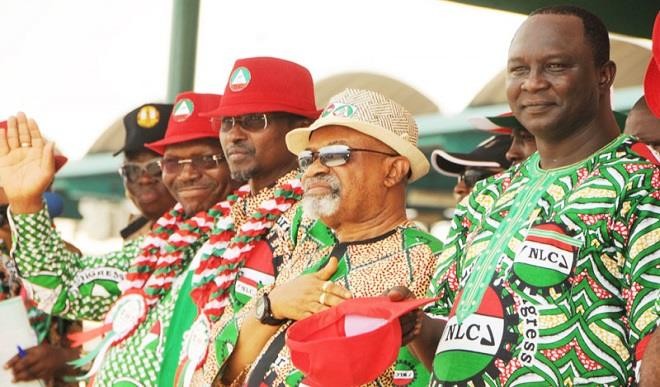
May Day, or Workers Day, is a public holiday in many countries worldwide. It usually is observed on May 1; it is a day for the celebration of workers.
The 2016 May Day rally took place at the Eagle Square, Abuja and in the capitals of the 36 states of the federation.
The theme of this year`s May Day is “The Working Class and the Quest for Socio-economic Revival.” Nigerian workers joined their counterparts all over the world to celebrate the dignity of labour.
“On May Day, we gather en masse to celebrate class solidarity and to show working class unity. We also use the May Day to celebrate social relevance as the creators of wealth on which the survival of our nation depends,’’ the NLC said in a pre-workers day briefing held in Abuja.
The NLC urged workers to use the occasion to work towards achieving economic revival, national rebirth and advocate for the engendering of pro-poor policies.
Despite the importance attached to the May Day celebration by the organised labour, however many Nigerians are of the view that the day has lost its significance.
An Abuja resident, Vincent Williams, said because the organised labour was no longer as prominent as it used to be, Labour Day had also lost its prominence.
Speaking in a similar vein, Rilwanu Musa, a trader, urged the NLC to keep all the empty boasts of fighting for the welfare of the masses to itself.
“The NLC is a toothless bull dog that barks without biting. It only makes noise in order to be settled. What is the NLC doing when Nigerians are subjected to unbearable hardship at filling stations where they are denied access to fuel while black marketers cart away jerrycans of the products. This fuel racketeering happens in broad daylight under the supervision of security agents. Is NLC not aware of this?’’ he asked.
When Daily Trust put the question to the immediate past General Secretary of the NLC, and present Executive Secretary of the Organisation of Trade Unions of West Africa (OTUWA), Comrade John Odah, he said those that believed that May Day has lost its significance need to be reminded of or educated on what the day is all about.
He said: “May Day is a day of commemoration of the struggle for eight-hour working day. In the course of this struggle, workers and police officers lost their lives during the infamous Haymarket massacre in Chicago in May 1886, precisely 130 years ago. How can anyone say remembering the people and event which made it possible for our generation to enjoy universal eight-hour work day has lost its significance?”
Odah commended the defunct Peoples Redemption Party (PRP) government of Balarabe Musa and Late Abubakar Rimi, for declaring May Day as public holiday in 1981 in Kaduna and Kano states, respectively, when they were governors of the two states, and which made the Shagari-led National Party of Nigeria (NPN) federal government to follow suit, declaring same the following year for the entire country.
The union leader said the way May Day is celebrated in Nigeria is unique as organised labour has made it a day in which the president of the country and senior government officers/or his representatives and state governors attend May Day programmes and listen to the demands of the working people.
“The fact that global capitalism in its Neo-liberal form is on the ascendancy worldwide and is making governments to roll back workers rights, won by our forebears, should never make us to take for granted the significance and symbolism of May Day. “Even in our sub region, a country like Sierra Leone is only going to have May Day as a public holiday for the first time ever, this May 1, 2016. So we should not underestimate what we have,” he said.
Also, the NLC president, Comrade Ayuba Wabba, enjoined Nigerians to start demanding for good governance, saying the issue of people sitting in their homes and shifting the burden is not what obtains elsewhere.
“We must be able to take our destiny in our hands because if policies are bad, they are bad. What the NLC will do is to create a platform where people can engage issues and get better result. Not for people to be sleeping in their houses and expecting the NLC to carry the burden alone, because it is not only about the workers but the general public, and the large interest of Nigerians. It is about good governance.
“The NLC as a mass organisation will remain very consistent in making sure that it continues this fight until the right thing is being done. And this is a battle that all Nigerians must continue to give their support,” he said.
Brief history of May Day
Working people around the world have always had to struggle to get decent wages, and safe working conditions.
In the 1860’s they campaigned for shorter working hours in many countries. On May 1, 1886, workers in Canada and the United States held peaceful strikes and rallies to demand an eight-hour work day. Two days later, Chicago police killed several demonstrators in a clash between workers and scabs in that city. A rally was held in Hay market square to protest the killings, and when the police tried to forcibly disperse the crowd, a bomb was thrown. Seven policemen were killed; dozens in the crowd were injured.
Although, none had thrown the bomb, eight leaders of the Chicago workers movement were charged with the death of the policemen. They were all convicted. Four were executed, one died in custody, and three were given life imprisonment, but were eventually pardoned.
In memory of this struggle and the struggle of all workers for better conditions, May 1 was declared an eight-hour holiday in 1889, by the International Workers’ Congress in Paris.
In many countries May 1 is a workers’ holiday celebrated every year. In Nigeria, May Day as a holiday was first declared by the People Redemption Party (PRP) government of Kano State in 1980. It became a national holiday on May 1, 1981.

 Join Daily Trust WhatsApp Community For Quick Access To News and Happenings Around You.
Join Daily Trust WhatsApp Community For Quick Access To News and Happenings Around You.


